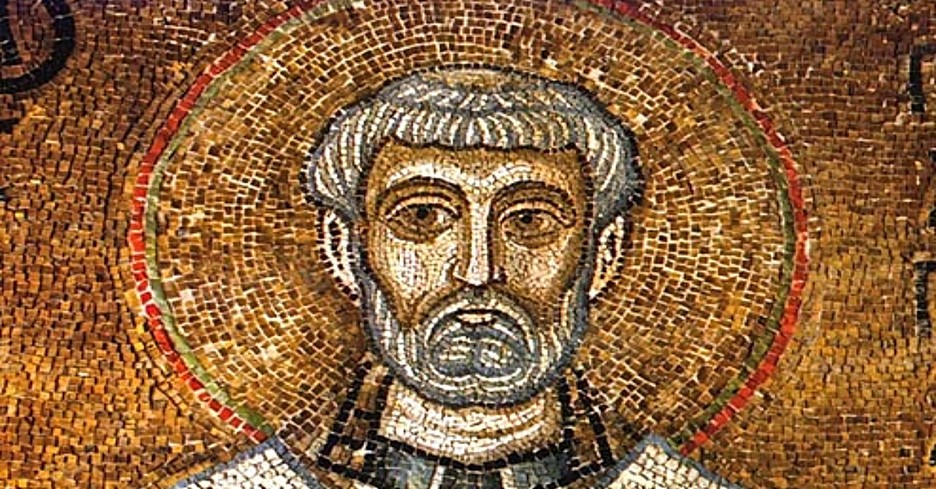
Can you imagine what it would have been like to be taught personally about Jesus by the apostle Paul or Peter? Clement of Rome was a first-century convert who had that incredible privilege. If you look in your New Testament at Philippians 4:3, you will see a Clement referred to who very well could be the same Clement we are looking at in this issue.
After Paul and Peter were martyred in Rome, Clement became a leader and bishop of the church there. You can visit the Church of San Clemente in Rome today, thought to be built over Clement's house. Tradition has it that, about 100 AD, he was martyred by being cast into the sea and tied to an anchor. Not much detail is known about Clement of Rome, but some of his writings provide valuable insight into the early church. His letter to the church at Corinth may be the earliest document we have outside the New Testament.
Yes, Corinth Again
Remember how Paul had to write letters to the church at Corinth dealing with terrible problems tearing apart the young church in that notoriously carnal city? Their problems persisted, and Clement sent a masterful letter to the Corinthians, reconciling them in peace, renewing their faith, and proclaiming the doctrine he had recently received from the apostles.
Get Rid of Those Old Guys!
Discord in Corinth had apparently flared up when a group of younger church leaders removed some of the older leaders; factions and petty arguments had developed around the two groups. Clement was writing to deal with the squabbles.
Clement warned that strife within the church is caused by envy, and the Scriptures show what evil envy produces - envy caused Cain to slay Abel, Joseph's brothers to sell him into bondage, Saul to pursue David: "Envy alienated wives from their husbands...have overthrown great cities and rooted up mighty nations." But the Scriptures also show that in every age the Lord will grant repentance to those who turn to him. Noah and Jonah, for example, preached such repentance.
With love and compassion, Clement urged his readers to: be of humble mind, laying aside all haughtiness, and pride, and foolishness, and angry feelings...being especially mindful of the words of the Lord Jesus which He spake, teaching us meekness and long-suffering.
Hurry Up to Perform
Clement of Rome reasoned that since none of our thoughts are hidden from God, we should seek to obey Him rather than follow the human leaders of any faction. Because we hope in the resurrection, we should live lives of purity and righteousness. Clement emphasized that we are not justified by our own understanding, works, or godliness but "by that faith through which, from the beginning, Almighty God has justified all men." Because of our justification and all God has done for us, "let us hurry with all energy and readiness to perform every good work." For the Christian, there is no reason for selfishness or self-promotion; Christians should work together in all harmony and peace.
Clement then encouraged the young men in Corinth to repent of their strife and disruption, which discouraged many within the church. He further urged the Corinthians to "pray for those who have fallen into sin, that meekness and humility may be given to them, so that they may submit, not unto us, but to the will of God."
Early Church Far from Perfect
We can easily tend to idealize the early church and think that their fellowship was pure and untroubled. Clement reminds us they struggled with the same temptations we do. In fact, his letter suggests that the deaths of the apostles Peter and Paul were probably brought about due to envy and strife among Christians: "Through jealousy and envy the greatest and most righteous pillars (Peter and Paul) were persecuted and contended unto death." The historian Tacitus commented that there were occasions when some Christians were arrested based on information supplied by other Christians.
Clement's letter to the Corinthians continued to be read in the Corinthian church as part of the liturgy for many years. The letter was popular among other churches throughout the ancient Roman world as well. Written by a man who had known Peter and Paul, who had a pastor's heart for all Christians, it was a great source of strength and guidance for early churches.
Clement's Prayer for Then and Now
The prayer at the conclusion of Clement's letter easily spans the centuries to become a prayer for Christians today: May God, who seeth all things, and who is the Ruler of all spirits and the Lord of all flesh - who chose our Lord Jesus Christ and us through Him to be a peculiar people - grant to every soul that calleth upon His glorious and holy Name, faith, fear, peace, patience, long-suffering, self-control, purity, and sobriety, to the well-pleasing of His Name, through our High Priest and Protector, Jesus Christ, by whom be to Him glory, and majesty, and power, and honor, both now and forevermore. Amen.
Clement of Rome's complete First Letter to the Corinthians has been reprinted as part of the Christian History Institute's series of Pocket Classics (which can be found under "early church" on this website).
Biblical quotes call for Holiness |
Photo credit: Wikipedia, Public Domain


